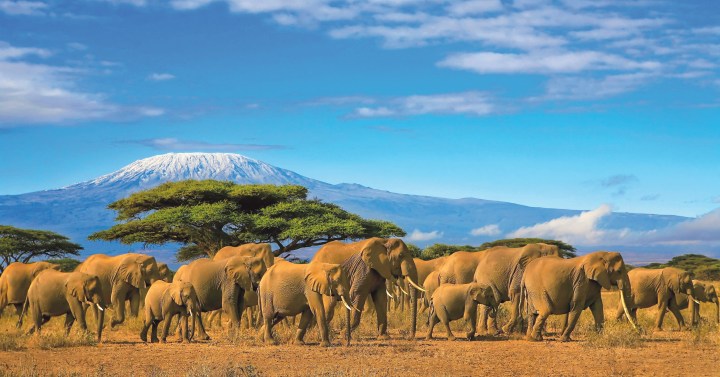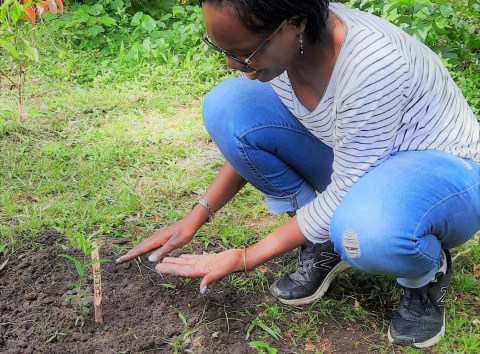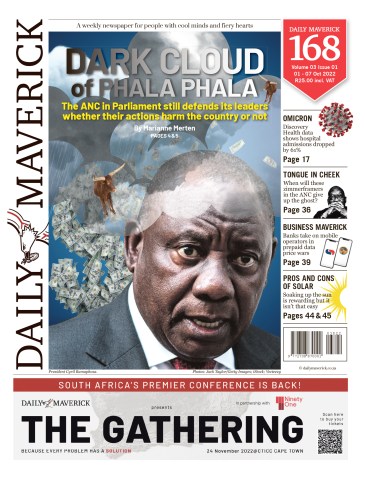ECO SOLUTIONS
Hack to the drawing board – smart tech ups the stakes in Africa’s conservation game

Tech-savvy solutions are shaking up the way the continent responds to environmental challenges.
It’s high time we embrace innovative tech solutions that young Africans are developing to promote conservation, says Dr Irene Amoke, executive director of the Kenya Wildlife Trust.
Amoke (43) is a presenter at the upcoming Oppenheimer Research Conference, from 5 to 7 October in Johannesburg. Her presentation, “Changing the conversation around conservation”, focuses on finding new funding flows to give people more incentives to conserve the wildlife among which they live.
Balance
Amoke would like to see a balance of traditional philanthropic, donor and tourism-derived funding, complemented by funding solutions that harness technology.
She argues that technology can revolutionise conservation in ways that open doors for young people to contribute tangibly.
Valuable lessons were learnt during the Covid-19 pandemic, says Amoke. As tourist dollars dried up, the conservation sector had to evolve and tap new sources, including crowdfunding campaigns.
“We had to adapt and show people who weren’t physically here why the conservation work we were doing on the ground mattered. And it had to be so meaningful to them that they’d reach into their own pockets and give to conserve wildlife,” says Amoke.

Brotherly love in the Masai Mara National Reserve. (Photo: iStock)
Widespread use of virtual reality camera traps had not only enabled this, but had stimulated further tech innovations that are fast becoming very useful to field biologists and conservationists.
Intelligent solutions
For example, intelligent solutions were required to sift through thousands of camera trap photos, she says.
Camera traps use sensors to detect movement. When an animal moves past a sensor it triggers a camera to record images or video. Being able to efficiently filter these recordings helps conservationists understand which animals are frequenting specific areas, thus providing information for management decisions.
Read more in Daily Maverick: “Riveted to the spots – passionate love of leopards unites thousands in ‘phenomenal’ citizen science project”
This technology, which monitors animal movement right down to specific individuals, can help reserves predict and mitigate against human-wildlife conflicts.
Amoke, who is fascinated by African predators, wants to see this technology developed and used to help keep tabs on the more than 500 lions in the Masai Mara reserve, in southwestern Kenya.
The SNI x Kenya Wildlife Trust Hackathon this month, for example, focuses on lion identification and data management as well as mitigating conflict between predators and farmers.
So how did a “city girl”, as she calls herself, come to be leading a predator conservation trust?
Amoke grew up in Nairobi, Kenya’s capital. Her first real experience of wildlife came on a primary school outing to Nairobi National Park, just 7km from the city. It is best known for breeding endangered black rhinos and is home to giraffes, zebras and lions.
Amoke also visited an elephant orphanage operated by the David Sheldrick Wildlife Trust. But that was not where her wildlife career aspirations really began.
Animals trump people
She had hoped to join the medical profession and chased her dream of becoming a doctor all the way to pre-med. But in biology class she realised she preferred animals to people.

Dr Irene Amoke plants seeds at Emboo Camp in Masai Mara. (Photo: Kenya Wildlife Trust)
A university camping trip to the Masai Mara, one of Africa’s most popular wildlife conservation areas, crystallised things further. It dawned on Amoke how much there was to learn about the continent’s rich wildlife and complex ecosystems.
She went on to achieve her dream of becoming a doctor – but of ecology, not of medicine.
Challenges
The conservation field comes with many challenges that can feel insurmountable, including climate change, a lack of funding, and looming extinctions.
Amid this, Amoke is proud of the role Kenya plays in preserving the continent’s wildlife. Witnessing this first-hand motivates her, especially when the going gets tough. And she’s enthusiastic about making space in conservation for young people with their inspiring and “unapologetic, brave” voices.
Read more in Daily Maverick: “SA in ground-breaking rethink on protection of biodiversity”
“I’m not against the traditional conservation approaches, but we need to be very open to using and incorporating new ideas. It’s time to have new, fresh voices.” She would like to see more conservation decision-making happening at the local community level.
She argues that new funding models are needed that enable communities to benefit economically in a way that is sustainable and is not reliant on handouts.
And if communities are to succeed in building wildlife-friendly businesses, private investment should also go hand-in-hand with improving financial literacy, says Amoke.
She applauds African-led research projects that prioritise the role of women in advancing environmental sciences and conservation priorities on the continent and eagerly awaits the announcement of the winner of the Jennifer Ward Oppenheimer Research Grant at the forthcoming conference.
Read more in Daily Maverick: “The big fence: Historical divisions plague conservation efforts in South Africa”
The three finalists are Dr Alice Karanja, a postdoctoral research fellow at the Center for International Forestry Research and World Agroforestry in Kenya; Elizabeth le Roux, a South African assistant professor at Denmark’s University of Aarhus; and University of Pretoria research fellow Dr Peta Brom.
Hackathon
The Mara Foundation’s “Hack the Mara”, in Kenya from 17 to 26 September, helped to foster deeper community involvement in wildlife conservation.
It brought together computer programmers to collaborate and compete in teams to come up with solutions to conservation problems. It was won by Nigeria’s Team Mastermind, which focused on building impactful USSD blockchain solutions in Web3. Second was Nigeria’s Team Blocverse, which builds everyday products with Web3 technologies. DM168
Rio Button is a Roving Reporters correspondent, South African science communicator and conservation biologist. This article, commissioned by Jive Media Africa, forms part of the Roving Reporters Game Changers series.
This story first appeared in our weekly Daily Maverick 168 newspaper, which is available countrywide for R25.




















 Become an Insider
Become an Insider
Comments - Please login in order to comment.